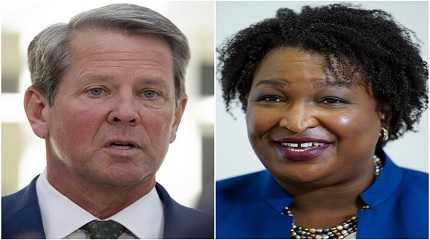
ATLANTA (AP) — Georgia Republican Gov. Brian Kemp and Democratic challenger Stacey Abrams are facing off in a rematch of the state’s last governor’s race, with both seeking a remarkable achievement.
Kemp, who was a developer before serving as a state senator and secretary of state, could clinch another term despite attacks from former President Donald Trump that threatened to snuff out support in his own party.
Abrams, a lawyer whose 2018 loss to Kemp helped launch her into Democratic stardom, would be the first Black woman to serve as a governor in the United States if she were to win. She seeks to avenge a defeat that she acknowledged while refusing to use the word “concede,” saying Kemp abused his prior position as secretary of state to raise barriers to voting.
Libertarian Shane Hazel is also on the ballot and could force a December runoff by preventing the other candidates from winning an absolute majority.
Although the rematch means few voters are discovering Kemp or Abrams anew, the race has been different.
Kemp, 59, seemed on shaky ground among Republicans after the 2020 presidential election, when Trump blamed him for not doing enough to overturn President Joe Biden’s narrow win in Georgia. Trump helped lure former U.S. Sen. David Perdue into a primary challenge to Kemp, whom he called a “complete and total failure”.
But Kemp motored away from Perdue during the GOP primary, winning nearly 74% of the vote. Kemp patiently explained his election actions to Republicans even as he used his office to sign conservative-pleasing bills loosening gun laws, cutting taxes and banning “divisive concepts” in schools.
While many incumbents are weakened by serious primary challenges, Kemp appeared to be strengthened. Trump’s attacks gave Kemp credibility with the narrow margin of Georgia voters who are willing to consider voting for either party, a largely white, college educated and suburban demographic.
Abrams, though, spent the four years since her defeat methodically laying the groundwork for another run. She formed a forceful voting rights advocacy group — Fair Fight Action — and built her own personal wealth as Democrats gobbled up her books and paid to attend her speeches.
Her national profile was so high that she was considered as a possible running mate for Biden or even a candidate for president herself. That helped Abrams outraise Kemp with the help of a state law that allows candidates for governor to accept unlimited contributions through an associated committee.
Abrams raised $85 million through Sept. 30, but even Kemp’s $60 million would have by far been a record for a governor’s race in Georgia, as he sought to build a national fundraising base. And Abrams’ financial advantage was never enough to run away with the race — Kemp has led in polls throughout.
Abrams, 48, rolled out a campaign that she once described as “rife with plans,” including a big pay raise for teachers, legalizing casino and sports gambling to pay for more college aid, expanding Medicaid health insurance, aiding small and minority-owned businesses, and making housing more affordable. At the same time, Abrams pledged to tighten Georgia’s gun laws and roll back abortion restrictions, arguing Kemp was far from moderate.
“The most dangerous thing facing Georgia is four more years of Brian Kemp,” Abrams said in an Oct. 17 debate.
Kemp highlighted his stewardship of the state economy and his decision to relax public restrictions early in the COVID-19 pandemic.
He also gave billions in tax breaks and handouts using federal and state money. Kemp pushed laws to suspend the state gas tax, give $1 billion of state income tax refunds and even give $350 to every person in the state on public assistance. He also pledged another income tax break and a property tax break if reelected, portraying the cash as helping Georgians “fight through 40-year-high inflation and high gas prices” that he blamed on Biden, Abrams and other Democrats.
But Kemp’s overall policy agenda was lighter than in 2018, appealing to voters to entrust him with another term mainly because of his performance. He did make criminal justice proposals, including making it harder for judges to release people without cash bail, and education proposals, including grants to school districts to help students catch up on what they might have missed because of the COVID-19 pandemic.
Kemp launched frequent attacks on Abrams, accusing her of not supporting police. He also called her “celebrity Stacey,” saying she would serve out-of-state interest and not “hardworking Georgians.”




